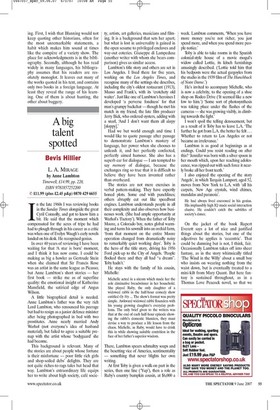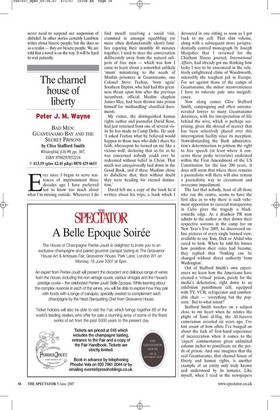A big talent spotted
Bevis Hillier L. A. MIRAGE by Anne Lambton Timewell, £14.99, pp. 220, ISBN 9781857252200 £11.99 (plus £2.45 p&p) 0870 429 6655 1 n the late 1960s I was reviewing books in the Sunday Times alongside the great Cyril Connolly, and got to know him a bit. He said that the moment which compensated for the acres of tripe he had had to plough through in his career as a critic was when one of Evelyn Waugh's early novels landed on his desk. He recognised genius.
In over 40 years of reviewing I have been waiting for that 'A star is born' moment, and I think it has now come. I could be making as big a howler as Gertrude Stein when she claimed that Sir Francis Rose was an artist in the same league as Picasso; but Anne Lambton's short stories — her first book — strike me as of superfine quality: the emotional insight of Katherine Mansfield, the satirical edge of Angus Wilson.
A little biographical detail is needed. Anne Lambton's father was the very rich Lord Lambton, who renounced his peerage but had to resign as a junior defence minister after being photographed in bed with two prostitutes. Anne nearly married Andy Warhol (not everyone's idea of husband material), but failed to agree a suitable prenup with the artist whose 'bodyguard' she had become.
This background is relevant. Many of the stories are about people whose fortune is their misfortune — poor little rich girls and shop-soiled debs' delights. They are not quite riches-to-rags tales but head that way. Lambton's extraordinary life equips her to write about high society, café society, artists, art galleries, musicians and filming. It is a background that sets her apart; but what is lost in universality is gained in the open sesame to privileged enclaves and way-out coteries. Giuseppe di Lampedusa (another writer with whom she bears comparison) gives us similar access.
Lambton's title story and others are set in Los Angeles. I lived there for five years, working on the Los Angeles Times, and recognise many of the settings she describes, including the city's oldest restaurant (1913), Musso and Frank's, with its 'crotchety old waiter'. Just like one of Lambton's heroines I developed 'a perverse fondness' for that man's grumpy backchat — though he met his match in my friend, the late film producer Jerry Bick, who ordered oysters, adding with a snarl, 'And I don't want them all slarpy [sloppy]: Had we but world enough and time I would like to quote passage after passage to demonstrate Lambton's mastery of language, her power when she chooses to unleash it, and her perfectly confected, perfectly aimed humour. She also has a superb ear for dialogue — I am tempted to say memory of dialogue, because the exchanges ring so true that it is difficult to believe they have been invented rather than overheard.
The stories are not mere exercises in verbal pattern-making. They have expertly honed plots. Some end with punchlines; others abruptly cut out like speedboat engines. Lambton understands people in all their complexity and also observes how businesses work. (She had ample opportunity at Warhol's `Factory'). When the father of Toby Moore, a Colorado boy, notes global warming and turns his sawmill into an orchid farm, 'from that moment on the entire Moore operation changed from dramatically noisy to remarkably quiet working days'. Toby is the hero of the title story, driving his 1956 Ford pick-up to the City of Angels. 'People flocked there and they all had "a dream". Toby hadn't.'
He stays with the family of his cousin, Michelle: Michelle acted in a sitcom which made her the sole diminutive breadwinner in her household. She played Ruby, the only daughter of a widowed rabbi in the half-hour comedy show entitled Oy Vey ... The show's format was pretty simple. Awkward widowed rabbi flounders with his young growing daughter's everyday problems. The only brief given to the writers was that at the end of each half-hour episode showing the rabbi's domestic blunders, they must devise a way to produce a life lesson from the chaos. Michelle, as Ruby, would have to drink this in while showing suitable contrition in the face of her father's superior wisdom.
There, Lambton spears schmaltzy soaps and the besetting vice of America, sentimentality — something that never blights her own writing.
At first Toby is given a walk-on part in the series, then one line (`Yup'), then a role as Ruby's country bumpkin cousin, at $6,000 a week. Lambton comments, 'When you have more money you're not richer, you just spend more, and when you spend more people notice.'
Toby is able to take rooms in the Spanish colonial-style house of a movie mogul's widow called Lottie, its kitsch furnishings amusingly described. (Lorne told him that his bedposts were the actual gargoyles from the studio in the 1939 film of The Hunchback of Notre Dame.') He's invited to accompany Michelle, who is now a celebrity, to the opening of a shoe shop on Rodeo Drive (It seemed like a new low to him ') 'Some sort of photosynthesis was taking place under the flashes of the cameras — she was growing visibly, in climbing towards the light.'
I won't spoil the telling denouement, but as a result of it Toby has to leave L.A. 'The further he got from L.A. the better he felt ... Whether to return to Los Angeles or not became an irrelevance.'
Lambton is as good at beginnings as at endings. Could you resist reading on after this? 'Jennifer was born with a silver spoon in her mouth which, upon her reaching adolescence, was ripped out with such force it nearly broke all her front teeth.'
I also enjoyed the opening of the story 'Angels', in which Tarquin Lamport, aged 52, moves from New York to L.A. with 'all his carpets, New Age crystals, wind chimes, mandalas and paranoia'.
He had always lived cocooned in his genius. His implausibly high IQ made social interaction elusive. He couldn't catch the subtitles of society's dance.
On the jacket of the book Rupert Everett says a lot of nice and justified things about the stories, but one of the adjectives he applies is 'eccentric'. That could be damning but is not, I think, fair. Occasionally Lambton takes off into sheer fantasy, as in the story whimsically titled 'The Wind in the Willy' about a small boy who insists on wearing nothing from the waist down, but is eventually treated to a mini-kilt from Mary Quant. But here fantasy is sustained throughout, as in a Thomas Love Peacock novel, so that we never need to suspend our suspension of disbelief. In other stories certainly Lambton writes about bizarre people; but she does so as a realist — they are bizarre people. We are told that a novel is on the way. It will be hard to wait patiently.





























































 Previous page
Previous page